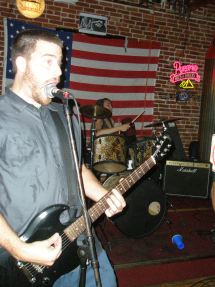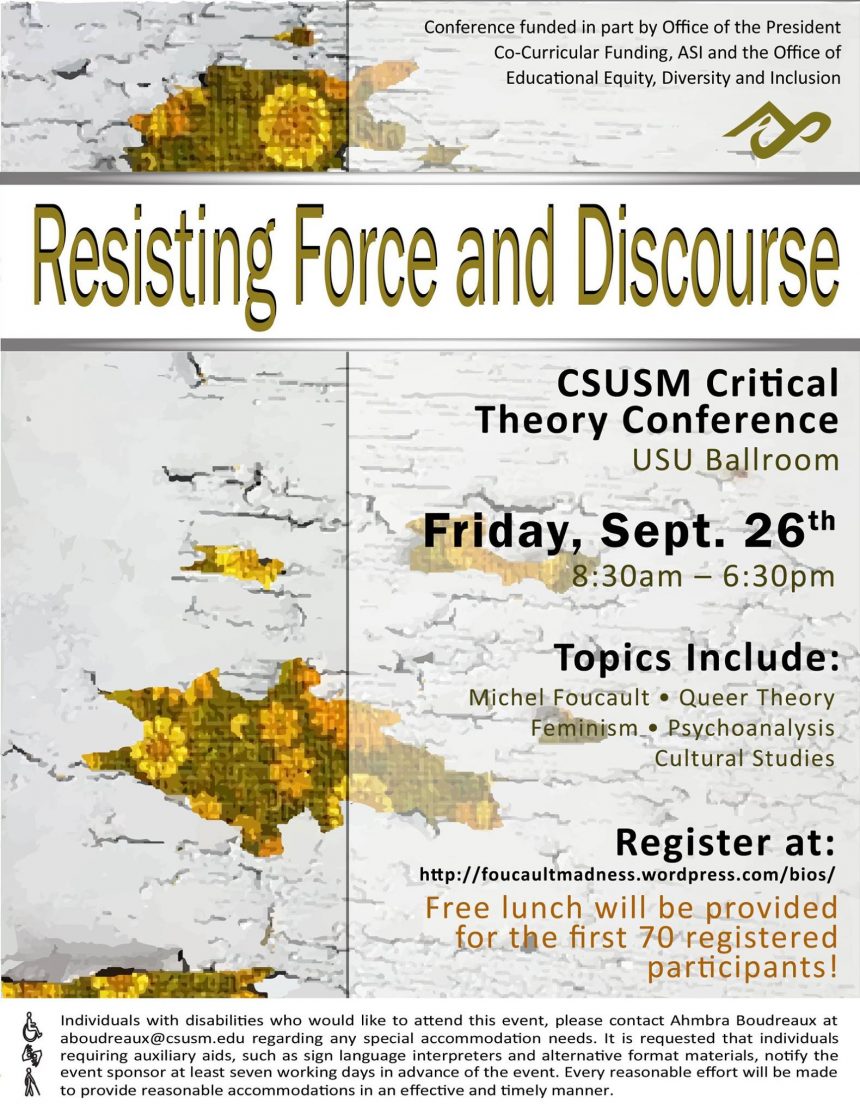The Foucault Madness Collective, in collaboration with CSUSM graduate students, the campus LGBTQA Club, and the ASI Community Centers, is pleased to announce the interdisciplinary conference: Resisting Force and Discourse
Inspired by the work of Michel Foucault, this conference uses Foucault’s models of power as a framework to explore subjugation across institutions and everyday discourse.
Graduate students, advance undergraduates, and professors from the regional area and elsewhere are welcome to submit abstracts and present their work. This kind of organization is in line with the conference goals to promote new knowledge, and foster a community of scholars, while maintaining the high standards of sophisticated academic work.
The conference includes: an opening performance, breakout sessions, a keynote panel, and a closing reception.
Refreshments and lunch will be provided for registered participants.
You can register at:
http://foucaultmadness.wordpress.com/
This conference is FREE and open to the public.
Questions the conference is concerned with include, but are not limited to the following:
– How is the policing and norming of marginalized bodies represented in literature and film? Or, newer cultural mediums, such as MMORGs and internet spaces?
– How do state regimes of punishment similarly besiege parolees and racial minorities?
– Does the U.S immigration system constitute a branch of biopolitical administration?
– How is the human body a political site (i.e., hunger strikes, self-branding, gender bending, trans politics)?
What is the function of the citizen “Other”?
– How do juridical and normative systems produce catastrophic violence that no one seems responsible for?
– Do social norms challenge the viability of HIV+ persons as subjects proper, leaving only a dangerous corporality?
– Which social norms are challenged through the undocuqueer identity marker and movement?
– Where do we find alternative networks, spaces, and autonomous zones? How are they constituted (i.e., spaces of reprieve and crisis heterotopias)?
For a full description of the conference theme see the call for papers:
http://foucaultmadness.wordpress.com/call-for-papers-5/
For any questions or comments you can reach us at:
foucault.madness@gmail.com
The Foucault Madness 2014 Conference Committee

Jairo Leon is a Literature and Writing major entering his last year at California State University San Marcos (CSUSM). Besides a full time student, he works at CSUSM’s LGBTQA Pride Center where he organizes the Lectures of Human Flourishing, and facilitates discussion groups, such as the Solidarity Sessions. A founding member of the Foucault Madness Collective, Jairo values collaborative knowledge production, and taking scholarship beyond the university. He is slightly nervous about applying to Phd programs this fall, but is far more excited. Rainer Maria Rilke and Xavier Villaurrutia are his favorite poets

Richard H. Hannon Jr. currently teaches English Composition at Palomar College. Co-founder of the Foucault Madness Collective, Richard Hannon spends his time playing in bands, reading critical theory, and mentoring current and former students. His scholarly interests include the study of: ritual violence, moshpits, scapegoating, gender, pscycho-geography, cyberspace, and heterotopias. His favorite writers include Norman O. Brown, Herbert Marcuse, Michel Foucault, Wendy Brown, and Philip Rieff.

April Cunningham is the Instruction/Information Literacy Librarian at Palomar College. She works with students as they build their habits of thinking critically about information. She’s also a drummer. Her interest in critical theory led her to join the Foucault Madness reading group.

Lisa Pradhan is a recent graduate of Smith College where she received her bachelors in Psychology and Religion, with a concentration in Buddhist Studies. She also completed the equivalency of a minor in Studio Art and the Buddhist Studies Certificate from the Five College Consortium. She is currently working on editing a social work book chapter, and has another article on couples conflict patterns in publication.
